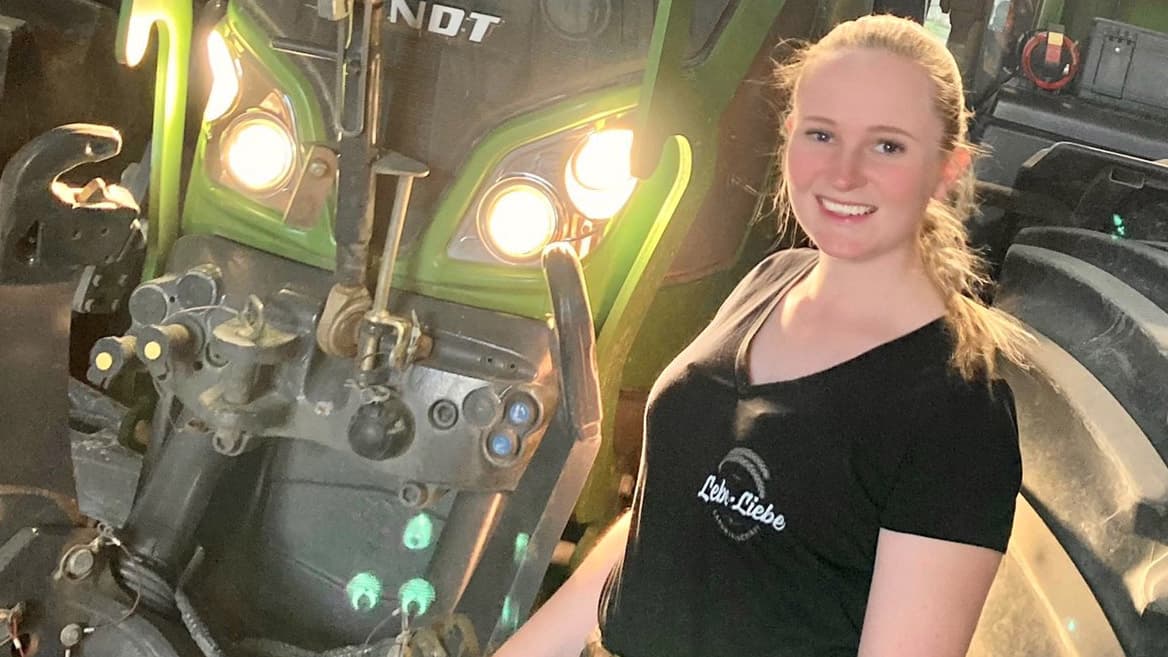
Caught between sustainability and technology: a passion for modern agriculture
06/07/2021Jacqueline Dresburg has devoted herself entirely to agriculture. The 19-year-old represents the new generation of farmers who stand for a brand of modern agriculture that is becoming more sustainable and more technological.
Jacqueline grew up in the world of agriculture. Her parents run a farm on a part-time basis about 25 kilometres south of Lippstadt in Warstein-Hirschberg, an enterprise that sells sustainable animal products under its own auspices. She herself has been passionate about animals and farms from an early age. "When I was a child, I used to pester my father because I really wanted to milk the cows," laughs the likeable young woman. "I finally did that then in a farm in our village. During my time in year 5 at school, I was there almost every day. This was when I began to develop my love for cows. At that time, one thing led to another. The deeper I dived into agriculture, the more passion I developed for the subject."
Today she is studying agricultural science at the Südwestfalen University of Applied Sciences in Soest. This makes the young student quite exotic even in the rather rural district of Soest, where Warstein-Hirschberg is located. "In my circle of friends, people study medicine, business administration or psychology," Jacqueline reveals. "And also from my secondary school, only one other person went into agriculture. However, it was no surprise to my friends that I decided to study agricultural science. I have always somehow been involved in agriculture. Everybody knows that it’s my element, my world. When I have to postpone arrangements made with my friends by two hours at short notice, I sometimes hear a comment like "Yeah, say hello to the tractor for me."
Small farm shop, big challenges
For the past year, the young agriculture student has also been running her own shop on her parents' farm. And here Jacqueline always emphasises a sustainable, regional approach. "We are now cultivating pumpkins for the second year and also popcorn maize and sunflowers in order to harvest the seeds," explains Jacqueline. We also have eggs from our own chickens, flour and juices on offer. We buy meat products, sausage, jam, honey and potatoes from suppliers within a radius of no more than 30 kilometres, and I know all the suppliers personally."
The big challenge here is this: to run the farm shop in a cost-efficient way. "If you calculated every hour that my grandpa, my boyfriend, my parents and I put into the farm shop – even at a minimum wage - it would look pretty bad," Jacqueline admits. "I do a lot of things out of love for farming and I don't really count the cost." A challenge shared by many farmers: "Many farmers are dependent on business with the food retail trade," explains Jacqueline. "However, the food retail trade dumps prices because goods can be imported from abroad. In Germany, we have very, very high standards that have to be met. That is why we simply cannot produce as cheaply as in some other countries, where the animals are sometimes even kept in high-rise buildings. In that respect, globalisation is a very big disadvantage."
Basically Jacqueline promotes the idea that consumers should be more concerned with the question of where the products come from and ask themselves whether they can't buy from the local farmer. For this reason, the energetic student tries to educate consumers on Facebook and Instagram about the problems of German agriculture and also about sustainable food consumption.
But what exactly is the passion for an industry that is under economic and not infrequently social pressure, a profession that has to cope constantly with new regulations and increasing bureaucracy? "I'm fascinated by the diversity, no two days are the same," says Jacqueline with great enthusiasm. "We farmers have to know a lot about a lot of things. On the one hand, this is exciting, but on the other, it is also a challenge to always have to stay up to date."
New technologies are advancing into modern agriculture
And then there is this little miracle of nature: "I find it fascinating that a small grain can turn into our bread. This form of value creation is indeed impressive. Interaction with the weather and then the new technologies available to the world of agriculture are also super exciting, too"
For example, digitalisation is increasingly finding its way into modern agriculture. "The health of the animals, for example, can already be digitally recorded exceptionally well today," Jacqueline reports. For example, by accurately measuring animal activity or the ruminating behaviour of cows. This technology is also particularly spectacular: "So-called N-sensors detect by means of light reflection how much nitrogen a plant needs. The sensors make use of the plants' ability to reflect different wavelengths to varying degrees depending on the nutrient supply. On the basis of the measured light reflection, the fertiliser spreader at the back of the tractor controls the amount of nitrogen needed and applies exactly as much fertiliser to plants as they actually need."
What exactly Jacqueline, who works as a harvest helper in the summer and who is also involved in projects on other farms, will do after she finishes her studies, she does not yet know. This is mainly because of the many opportunities offered to the active 19-year-old by modern agriculture. But one thing is certain: "I will definitely remain true to agriculture. I would also like to remain involved in the field of public relations. And until I graduate, I will continue to carry out internships in a variety of sectors."
The question remains of how Jacqueline will manage to juggle all the tasks. Jacqueline dismisses this fear in a relaxed way with a wave of the hand: "My day sometimes starts at 6am and doesn’t end until 10pm. You have to map out a structure for yourself. But when you're having fun, anything is possible!"